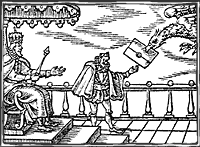There was no doubt an attempt to blow up Parliament on November 5th 1605. But Guy Fawkes and
his associates may have been caught in a Jacobean sting operation which would have served the authorities
by casting Catholics, or Recusants, as an enemy to be pursued.
By the time Queen Elizabeth died, after ruling for about fifty years,
most people only remembered living under her rule. When James I succeeded to the
throne, many saw an opportunity for change. Those who felt particularly hard done by,
both by Elizabeth I and James I, even felt that the situation was so
bad as to require, in Fawkes' own words, "a desperate remedy": it was an opportunity
to simply replace the current king.
These were unstable times indeed, with several smaller plots being discovered in the years
preceding 1605. In fact, many of the Gunpowder plotters were known as traitors to the authorities.
For this reason, it would have been difficult, if not unlikely,
for them to gather 36 barrels of gunpowder and store them in a cellar
under the house of Lords without the security forces getting suspicious.
 Furthermore,
the letter warning one of the members
of government to stay away from Parliament is believed today to have been
fabricated by the king's officials. Historians suggest that the King's officials already knew about the plot,
that one of the plotters in fact revealed the key points of the plot to the authorities.
The suspected turncoat? Francis Tresham.
Furthermore,
the letter warning one of the members
of government to stay away from Parliament is believed today to have been
fabricated by the king's officials. Historians suggest that the King's officials already knew about the plot,
that one of the plotters in fact revealed the key points of the plot to the authorities.
The suspected turncoat? Francis Tresham.
The letter, then, would be a tool created by the King's officials to
explain how, at the last minute, the king found out about the Plot
and stopped it just before it wreaked its havoc on Parliament and himself. At the same time,
the letter was vague enough to give the officials all the latitude they
wanted in falsifying confessions and to pursue their own anti-Catholic ends.
There are two fundamental problems with the letter. Firstly, the letter
was unsigned. Any and all of the conspirators, once apprehended, might have
saved themselves from torture and perhaps even death if they could claim
to have written it. None did. Not one of the conspirators who was
caught appears to have known about the letter. Secondly, the letter was
very vague in its content. It said nothing about the details of the planned
attack. Still, the king and his men knew exactly the where and when to catch
the conspirators and stop the explosion just hours before it was to take place.
How did they know?



